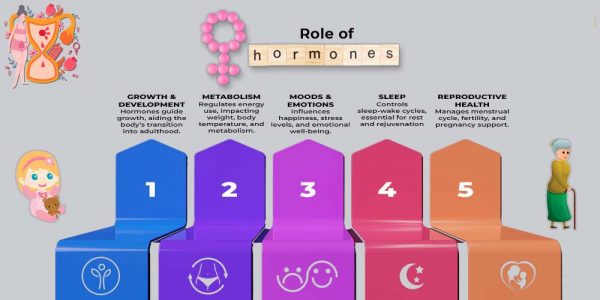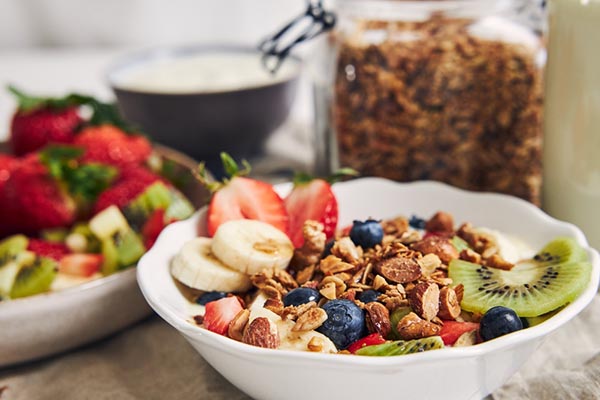Balancing Celebration and Wellness: The Gynaecologist’s Guide to Festive Nutrition
Every festive season, I meet women who confess that joy often comes with exhaustion. Between preparing sweets, hosting guests, and late-night celebrations, they end up skipping meals or sleep — only to feel bloated, drained, or emotionally off balance later. Festivals should rejuvenate us, yet for many women, they create silent stress on hormones, digestion, and overall energy. This is where understanding festive nutrition for women becomes essential.
 How we eat, rest, and recover during celebrations deeply influences our health, especially our hormonal and digestive balance.
How we eat, rest, and recover during celebrations deeply influences our health, especially our hormonal and digestive balance.
As a Senior Consultant Obstetrician and Gynaecologist, I have seen how small, mindful shifts in healthy eating habits and rest can prevent post-festive fatigue, bloating, and mood swings. This article offers a medical yet practical guide to help women celebrate joyfully while maintaining hormonal harmony, steady energy, and long-term wellness. Balance begins with awareness, not restriction.
Also Read:
- Healthy Eating Tips: Nourishing Pregnancy During Festivals
- Festive Foods & Female Hormones: What Every Woman Should Know?
- Women’s Health After 40: What Changes and How to Stay Ahead
Eating Smart: The Foundation of Festive Nutrition for Women
Festive eating is about choice, not restriction. The challenge is maintaining healthy eating habits while enjoying family traditions. During celebrations, women often skip meals, eat late, or consume more sugar and fried foods than usual. These habits can disturb blood sugar levels and digestion. The goal is to plan, portion, and pace yourself.
Why structured meals matter
Irregular meal timing confuses metabolism. A balanced breakfast with protein, fruit, and fibre stabilises blood sugar and prevents bingeing later. Include traditional dishes, but balance them with lighter meals through the day.
Building a balanced festive plate
To make your plate healthy and satisfying:
- Fill half with vegetables or salads.
- Add one protein source such as paneer, lentils, or eggs.
- Choose whole grains instead of refined flour.
- Enjoy desserts in small portions after meals, not on an empty stomach.
Managing indulgence mindfully
Sweets are part of every celebration. The key is moderation. Choose jaggery-based sweets, dry fruit laddoos, or baked treats. Hydrate between meals and limit caffeine to avoid dehydration.
Consistency in timing, balanced plates, and portion awareness are simple ways to make celebrations healthier without missing out on joy.
Preventing PCOS Flare-ups and Hormonal Imbalance
Women with PCOS often find festivals challenging. High-sugar diets, late nights, and stress can trigger symptoms like acne, bloating, and fatigue. Managing PCOS and festive diet patterns requires planning, not deprivation.
 How festive foods affect hormones
How festive foods affect hormones
Sugary and processed foods raise insulin and cortisol, both of which worsen PCOS. Lack of sleep lowers progesterone, affecting cycles and mood. Maintaining hormonal balance means staying hydrated, sleeping well, and keeping meals regular.
PCOS-friendly festive strategies
Women with PCOS often find the festive season challenging. They experience greater hormonal fluctuations, and festive overeating can worsen insulin resistance and mood swings. Here are practical mindful eating tips for women managing PCOS:
- Start your day with protein-rich breakfasts like sprouts, eggs, or Greek yoghurt.
- Carry healthy snacks such as roasted makhana or nuts when attending functions.
- Avoid sugar-loaded drinks and opt for buttermilk, coconut water, or lemon water.
- Don’t skip meals; eat small portions regularly.
Maintaining nutritional balance during the festive season is vital for women’s health, especially during pregnancy. Magnesium-rich foods like nuts, seeds, and leafy greens support hormonal balance, reduce cravings, and ease premenstrual symptoms during celebrations.
Simple swaps that work
Replace white rice with millets or brown rice. Choose roasted snacks instead of deep-fried ones. A small piece of dark chocolate can satisfy sweet cravings better than syrupy desserts.
Key insight: With preparation and mindful swaps, women with PCOS can enjoy festive food without hormonal disruption or post-celebration fatigue.
Caring for Digestive Health During the Festive Rush
Festive overeating can leave many women feeling heavy, gassy, or constipated. The body needs a steady rhythm for digestion, which celebrations often disturb. Protecting digestive health begins with recognising triggers and supporting the gut through small, consistent actions.
Common digestive triggers
Late-night eating, carbonated drinks, and fried snacks delay digestion. Large mixed meals overwhelm the stomach, leading to acidity and bloating. When you eat slowly and chew thoroughly, your body digests more efficiently.
Simple home remedies for comfort
Here are easy, doctor-approved digestive resets:
- Begin mornings with warm water and lemon or ajwain.
- Include curd or probiotic foods once daily.
- Add ginger or jeera to meals to boost metabolism.
- Walk for ten minutes after dinner to aid digestion.
Foods that help the gut recover
Add fibre through fruits, vegetables, and whole grains. Limit alcohol and processed snacks, as both irritate the gut lining. Drink two to three litres of water daily to maintain digestive flow.
Lesson: Small, consistent steps like hydration, slow eating, and light movement help restore gut balance during and after festivals.
Sleep, Stress, and Hormonal Balance During Celebrations
Festivities often lead to irregular sleep schedules, long nights, and high stress. Yet rest and relaxation are vital for maintaining hormonal balance. Hormones such as estrogen, progesterone, and cortisol are sensitive to lifestyle fluctuations.
For women at 40, hormonal shifts around perimenopause can heighten fatigue and bloating. Prioritising sleep, hydration, and light balanced meals during festivals helps maintain energy and emotional stability.
How poor sleep impacts women’s health
Sleep deprivation increases cortisol, leading to anxiety, mood swings, and water retention. It also affects metabolism and digestion. Make sure you get six to seven hours of uninterrupted rest.
Restorative routines for better balance
- Switch off screens an hour before sleeping.
- Drink chamomile or herbal tea instead of caffeine at night.
- Use deep breathing or meditation for five minutes before bed.
- Keep your bedroom cool and dim for quality sleep.
Hydration and stress control
Festive dehydration worsens fatigue. Drink water regularly and add fresh juices or soups to maintain balance. Manage stress by saying no to overcommitment and taking short breaks between tasks.
Practical note: When rest and hydration are treated as priorities, the body recovers faster, hormones stay balanced, and you enjoy the. Be mindful of festive nutrition for women
Also Read:
- Festive Nights, Healthy Mornings: Sleep Care Tips for Women
- PCOS Risks & Long-Term Wellness: Essential Strategies
Conclusion: Make Wellness Your Festival Companion
Festivals are meant to celebrate togetherness and gratitude. Yet, they should not come at the cost of well-being. Practicing festive nutrition for women means eating mindfully, supporting digestion, and maintaining healthy eating habits through awareness. Balance is not about perfection. It is about small, thoughtful choices that honour your health while keeping traditions alive.
As a gynaecologist, I encourage every woman to treat her health as part of her celebration. Keep your meals light, your sleep consistent, and your joy authentic. This festive season, nourish your body, care for your hormones, and celebrate the spirit of wellness.
Our Digital Imprints:
Dr. Madhu Goel
Senior Consultant Obstetrician and Gynaecologist
Director, Fortis La Femme
I am passionate about women’s health. With expertise in managing high-risk pregnancies, infertility, and various gynaecological issues, I strive to provide compassionate care. I am committed to ensuring the well-being of my patients. Follow me for insights and updates on women’s health.
Get Connected to my Newsletter
“Health Hub”: Women’s Health & Wellness
Connect with me: Instagram | Facebook | LinkedIn







